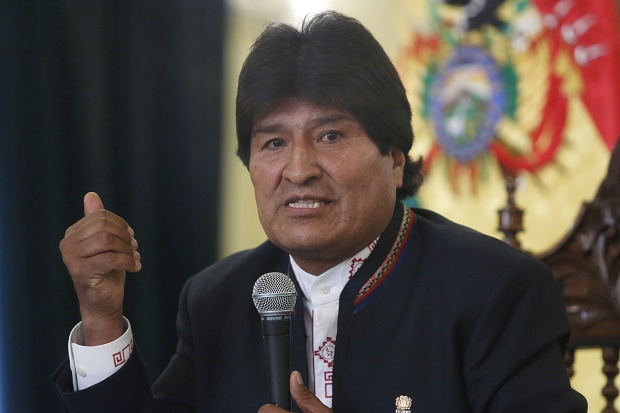Bolivia’s Morales vows to forge ‘struggle’ despite referendum loss

Bolivia’s President Evo Morales speaks during a press conference at the government palace in La Paz, Bolivia, Wednesday, Feb. 24, 2016. Bolivian voters have handed Evo Morales his first electoral defeat as president, rejecting by a slim margin a constitutional amendment that would have let him run for a fourth consecutive term in 2019. Morales in recognizing his defeat said “That he has lost a battle but not the war.” AP Photo
LA PAZ, Bolivia—Bolivia’s President Evo Morales vowed Wednesday to pursue his Socialist “struggle” despite a stinging defeat in a referendum to extend his rule that confirmed strong headwinds across Latin America for leftist leaders.
“We have lost a democratic battle, but not the war,” the indigenous 56-year-old said after accepting that his proposal for a constitutional reform to lift his term limit had met defeat in a Sunday plebiscite.
READ: Morales facing defeat in key Bolivia vote—partial results
“We respect the results, it is part of democracy,” he said, but declared: “The struggle goes on.”
A tally of virtually all ballots cast showed 51 percent had voted against his reform and 49 percent were in favor.
Article continues after this advertisementThe referendum defeat was Morales’ first direct election loss since taking office a decade ago. It means he will have to step down at the end of his current mandate, in 2020.
Article continues after this advertisementREAD: Bolivia’s Morales marks decade in office, eyeing more
Morales is already Bolivia’s longest-serving leader since independence from Spain in 1825.
Anti-left backlash
His loss highlighted what appears to be a regionwide backlash against leftist leaders and governments that enjoyed power across much of Latin America in the early years of this century.
In next-door Brazil, President Dilma Rousseff, the deeply unpopular anointed successor to working-class hero Luiz Inacio Lula da Silva, is struggling against an impeachment push, a huge corruption scandal and a crumbling economy just ahead of the Olympic Games in Rio de Janeiro.
In Venezuela, Nicolas Maduro, chosen successor to the late Hugo Chavez, is being forced to adapt to an opposition-run parliament while also overseeing a tanking economy.
And in Argentina, a new, business-friendly president, Mauricio Macri, is busy setting about undoing the protectionist policies of his populist predecessor, Cristina Kirchner.
In Morales’ case, the poll defeat had less to do with a conservative pushback than perceptions of corruption.
“Unlike other Latin American presidents, he remains a popular and respected figure,” noted Gaspard Estrada, a Latin America expert at the Sciences Po university in Paris.
Morales’ support remains especially high among indigenous groups and grassroots organizations that have prospered during his time in power, which saw Bolivia’s mineral and gas-rich economy more than triple in size.
But his reputation took a hit on allegations he used his influence in favor of contracts for CAMC, a Chinese engineering company that employs his ex-girlfriend.
Rural leaders close to him are also being investigated in a $2.5-million fraud case, and the opposition has accused him of wasteful spending.
‘I can leave happily’
Under Bolivia’s constitution, the president gets a five-year mandate renewable just once.
Morales already had the constitution changed once, three years after taking power in 2006.
Under that revised constitution he was again elected president in 2009, then won his one-off renewal in 2014. His current term ends in 2020.
Morales blamed the vote against the referendum on a “dirty war on social networks.”
He predicted that, even with his departure in four years, the Socialist momentum he had given to the economy and politics would continue through “the Bolivian people.”
“The program is not in debate,” he said.
However Morales’ loss could disrupt the remainder of his term and his Movement to Socialism (MAS) party, a grouping of unions and social movements, analysts say.
It “will probably cause an internal struggle to replace him,” analyst Andres Torres predicted.
Analysts at the Eurasia Group consultancy said, though, that Bolivia’s relatively strong economy made it “unlikely” that the country would suffer instability in the short term.
Morales himself has insisted he is ready to go quietly into political retirement when the time comes.
“With my record, I can leave happily and go home content. I would love to be a sports trainer,” the Spanish newspaper El Pais quoted him as saying. Morales is a noted football fan who plays with local teams.